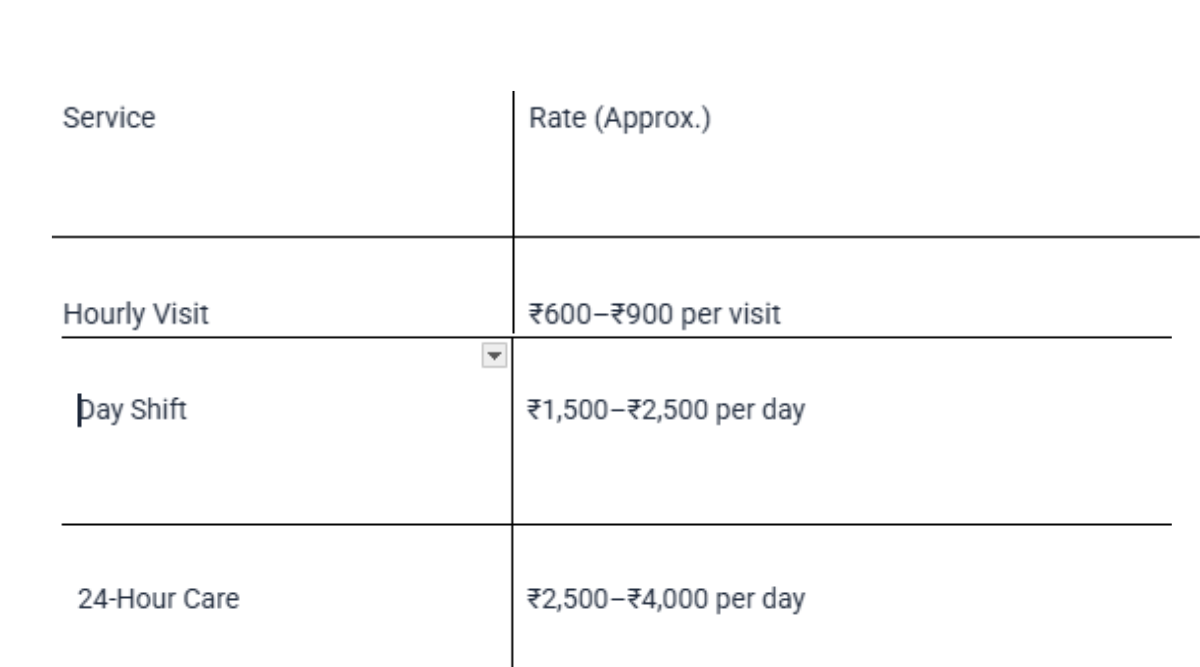Choosing a home nurse for a loved one is a big decision. You want someone skilled, but you also want someone kind who feels right in your home. This guide shows families and caregivers how to select a nurse who brings peace, professionalism, and safety with every visit. Reading this, you’ll learn what to check and how to trust your choice.
Understanding Your Needs
Assessing Patient Needs for Home Nursing
What kind of help does the patient need at home? Medical reasons are one thing; daily support is another. Make a short list of tasks—like wound care, help moving around, giving medicines, or making sure the patient is safe in bed at night. When you know exactly what should be done, you can pick the right nurse.
Tip: Use simple checklists. They help you stay organized and spot anything missed.
Types of Home Care Services Available
Home care is different for every family. Some need a nurse for just an hour or two. Others need day and night help.
- Daily visits for medicines or dressings
- Personal care help: bathing, feeding, walking
- Support for recovery from surgery or illness
- Care that feels more like a companion, checking in on loneliness or mood
Ask what your loved one needs to feel healthy and happy at home.
Matching Medical Complexity to Nurse Qualification
Some patients need a nurse able to handle difficult medical tasks. Others need gentle day-to-day support. Always talk about health details—like diabetes, stroke care, or recovery instructions from your doctor. Choose someone with the right background for these needs.

Differences Between Nurse, Attendant, and Aide
- Registered Nurse (RN): Handles medical tasks and monitors health changes.
- Nursing Assistant: Helps with bathing, feeding, and moving but not complex medical jobs.
- Attendant/Aide: Cares for comfort, keeps company, helps with light chores.
Getting the right fit makes daily life easier for everyone.
Using Care Assessment Tools
Sometimes, tools like the Katz Index are used to see how much help is needed. If your agency offers to assess the home, welcome it. The more you know, the safer your loved one will be.
Qualifications: What Truly Matters
Educational Background & Certifications to Check
Always check the nurse’s certificates. Is their training real? In India, many nurses have GNM or B.Sc Nursing degrees. Ask for proof and see if they are registered with state health authorities. If you’re working with Dr.Morepen Home, certifications are always checked before sending a nurse to your home.
Registered Nurses vs. Nurse Assistants vs. Attendants
- RNs do complex jobs—like giving injections, reading medical charts, or helping after surgery.
- Nurse assistants help with personal things.
- Attendants focus more on comfort and light support.
Match tasks to the role; safety comes first.
Verifying Professional Licenses & Training
Never skip checking for licenses—ask to see them. If using an agency, make sure they do this for you.
Specializations for Chronic, Elderly, or Post-Surgical Care
Does your patient have Alzheimer’s, Parkinson’s, or recent heart surgery? Choose someone with special training for those cases. A nurse used to working with older adults has skills that help keep life normal.

Importance of Agency Accreditation
Hire only from agencies who follow rules. Ask for details about how nurses are trained. Good agencies are open about these things. It builds trust.
Assessing Experience: Going Beyond the Resume
Years of Clinical Practice & Relevant Experience
It’s not just about how many years someone has worked. Was their experience in hospital wards? Did they care for patients with similar health issues? Experience matters most when it matches your loved one’s health needs.
Hospital vs. Home Care Experience
Hospital jobs mean nurses see many patients at once. Home nursing is more personal. Choose a nurse who understands how home routines work—and can adapt easily.
References, Testimonials, and Past Client Reviews
Reviews from other families help you know what to expect. Ask for references or look at online feedback before making your decision.
Handling Emergencies and Unusual Medical Situations
Ask if they’ve ever handled an emergency at home. What did they do? The answer will show their skills.
Empathy, Communication, and Patient Compatibility
The nurse should connect with your loved one. Are they patient? Do they listen well? This bond turns care into comfort.
Trust & Safety: Making Confident Choices

Importance of Background Checks
Look for agencies that check backgrounds. You want to feel safe with anyone entering your home.
Insurance and Legal Protection for Families
Ask if the nurse is insured. This protects your family if anything goes wrong during care.
In-Home Trial & Probation Periods
Request a short trial period. See how the nurse fits with your routine before making long-term plans.
Agency Reliability vs. Direct Hiring
Agencies like Dr.Morepen Home do background checks, provide replacements if needed, and help with urgent issues. Direct hiring may be cheaper but can lack support during emergencies.
Contract Review: What Every Family Must Check
Read the contract. Make sure it lists everything—care tasks, working hours, what happens in emergencies, and payment rules.
Costs, Contracts & Value
Pricing Models for Home Nursing
Cost depends on hours, nurse type, and services.

Always check for clear pricing.
Transparent Billing and Avoiding Hidden Charges
Ask for a breakdown of costs. Good agencies tell you what you’re paying for—so there are no surprises.
Comparison: Full-Time, Part-Time, and Round-the-Clock Services
Pick what fits your needs:
- Full-time: best for complex cases
- Part-time: good for medical checkups
- All-day care: needed for those who shouldn’t be left alone
Cost vs. Quality Trade-offs
Sometimes lower costs mean less training or support. Make choices based on care, not only price.
Reimbursement & Insurance Coverage Options
Some insurance covers nursing. Ask the agency or your provider for details. They can often help with paperwork.
Creating Personalized Care Plans
Steps to Customizing Care Plans
Each plan should measure the patient’s needs and be easy to update. The nurse, doctor, and family should work together.

Coordination Between Physicians, Nurses, and Therapists
Dr.Morepen Home has care coordinators to keep everyone organized. Regular meetings help look after every detail.
Frequency and Flexibility of Care Visits
Adjust care visits if health changes. A flexible schedule helps keep patients comfortable.
Reviewing and Updating Care Plans as Needs Change
If the patient gets better or needs extra help, make changes quickly. Keep lines open with the nurse and agency.
Conclusion
Choosing the right home nurse takes time and clear thinking. You start by understanding your loved one’s needs and matching those to a nurse’s skills and attitude. Always check credentials, ask about experience with similar health problems, and be sure background checks are done. Reliable agencies like Dr. Morepen Home provide extra layers of protection, ongoing support, and help you navigate contracts and emergencies. While price matters, never trade safety or comfort for a lower bill. Remember, the right nurse becomes more than a helper—they become a trusted part of your family’s care journey.
With steady communication, regular care plan reviews, and careful attention to everyone’s comfort, you ensure the best outcome for your loved one at home. Trust your instincts, ask questions, and choose what truly gives peace of mind.
Frequently Asked Questions
1 How do I know if a home nurse is qualified?
Ask to see nursing degrees, professional registration, and proof of training. Reputable agencies do this work for you and provide only screened, certified caregivers.
2 What background checks should be done?
A background check should include education verification, police clearance, references from past patients, and ongoing monitoring from the agency. Don’t hesitate to request these details.
3 Can I change nurses if the match isn’t right?
Yes, good agencies allow for changes if the nurse’s skills or personality aren’t a fit. Always communicate your concerns early so adjustments can be made smoothly.
4 How long should a nurse stay during each visit?
It depends on care needs—some visits are quick for procedures, others are several hours or even round-the-clock for higher needs. Discuss your schedule and health goals with the agency to form a clear plan.
5 Is home nursing covered by insurance?
Some insurance policies do include home nursing under specific conditions. Always check your provider’s list and ask the agency for paperwork help. They may also offer flexible payment and reimbursement support.
.png)


.png)
.png)
.png)
.png)
.png)
.png)
.png)
.png)
.png)
.png)
.png)
.png)
.png)
.png)
.png)
.png)
.png)
.png)
.png)
.png)
.png)


.png)
.png)
.png)
.png)
.png)
.png)
.png)

.png)
.png)
.png)

.png)
.png)
.png)
.png)
.png)
.png)

.png)
.png)

.png)
.png)
.png)

.png)

.png)


.png)







